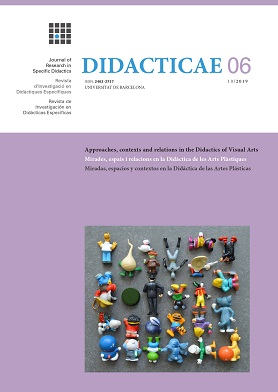La creación artística en la educación de las personas con diversidad funcional: Una investigación-acción
Artistic creation in the education of people with functional diversity: An action-research project
DOI:
https://doi.org/10.1344/did.2019.6.37-52Keywords:
artistic creation, functional diversity, action-researchAbstract
The following text presents an action-research project on how spaces of artistic creation, spaces of freedom with security, in an educational context with children with functional diversity (FD), develop the components of a self-determined behaviour. The first part covers two fields of study which generally run in parallel: the artistic creation and the education of people with FD. Secondly, it relates these people to an experience of educational intervention, object of analysis and reflection of this paper. This action-research project demonstrates how artistic creation leads students with DF to acting autonomously, to self-regulating their behaviour, to initiating and responding to events in a psychologically proficient manner and, finally, to acting consciously.
References
AAMR (2006). El retard mental. Definició, classificació i sistemes de suport. Barcelona: Eumo Editorial.
Dewey, J. (1933). How we think. Boston: Health & Co (Traducción castellana: Cómo pensamos. Barcelona: Paidós, 1989.
Dewey, J. (1974). John Dewey on education: Selected writings. Chicago: University of Chicago Press.
Dewey, J. (2008). El arte como experiencia. Barcelona: Paidós.
Eisner, E. (2005). Educar la visión artística. Barcelona: Paidós.
Ferrés, J. (2008). La educación como industria del deseo. Un nuevo estilo comunicativo. Barcelona: Gedisa.
Freire, H. (2008). Arte infantil y transformación social. El rapto de Europa. Pensamiento y creación, 13, 23-38. Madrid: Calamar Edición.
Jollien, A. (2001). Elogio de la debilidad. Barcelona: RBA S.A.
Kemmis, S., y Mc Taggart, R. (1988). Cómo planificar la investigación-acción. Barcelona: Laertes.
Nirje, B. (1972). The right to self-determination. En W. Wolfensberger (Ed.), Normalization: the principle of normalization, pp. 176-200. Toronto: National Institut on Mental Retardation.
Schalock, R. L. (1999). Hacia una nueva concepción de la discapacidad. Siglo Cero. Revista española sobre discapacidad intelectual, 30, 1.
Schalock, R. L. (2001) Conducta adaptativa, competencia personal y calidad de vida. En A. Verdugo y F. Borja (Coords.), Apoyos, autodeterminación y calidad de vida. IV Jornadas científicas de investigación sobre personas con discapacidad, pp. 83-104. Salamanca: Amaru Ediciones.
Schon, D. A. (1992). La formación de profesionales reflexivos. Hacia un nuevo diseño en la enseñanza y el aprendizaje en las profesiones. Madrid: Paidós/MEC.
Stenhouse, L. (1998). La investigación como base de la enseñanza. Madrid: Morata.
UNESCO (2006). Conferencia Mundial sobre la Educación Artística: construir capacidades creativas para el siglo XXI. Hoja de ruta para la Educación Artística. Recuperado el 2/02/2019, de: http://portal.unesco.org/culture/es/ev.php-URL_ID=39546&URL_DO=DO_TOPIC&URL_SECTION=201.html.
UNESCO. (2010) La Agenda de Seúl: Objetivos para el desarrollo de la educación artística. Recuperado el 2/02/2019, de: http://portal.unesco.org/culture/es/ev.php-URL_ID=2916&URL_DO=DO_TOPIC&URL_SECTION=201.html.
Wehmeyer, M. L. (2001). Autodeterminación una visión de conjunto conceptual y análisis empírico. Siglo Cero. Revista española sobre la discapacidad intelectual, 32(2),194, 5-15.
Wehmeyer, M. L. (2003). Autodeterminació i accés al currículum general. Promoure l’autodeterminació i l’accés al currículum general. Suports, 7(2), 78-90.
Wehmeyer, M. L. (2006). Autodeterminación y personas con discapacidades severas. Siglo Cero. Revista española sobre Discapacidad Intelectual, 37(4), 220, 4-16.
Whitehead, J. (1989). How do we improve research-based professionalism in education? A question which includes action research, educational theory and the politics of educational knowledge. British Educational Research Journal, 15(1), 3-17.
Downloads
Published
Issue
Section
License
Copyright (c) 2019 Mar Morón

This work is licensed under a Creative Commons Attribution-ShareAlike 4.0 International License.
The authors who publish in this journal agree to the following terms:
- Authors retain copyright and grant the journal the right of first publication.
- Submitting a paper does not involve paying any fees.
- Texts will be published under a Creative Commons Attribution Share-Alike 4.0 International License that allows others to share the work, provided they include an acknowledgement of the work’s authorship, its initial publication in this journal and the terms of the license.
- When citing works published in Didacticae, both the autor and the journal must be cited.
- Didacticae does not accept any responsibility for the points of view and statements made by the authors.



